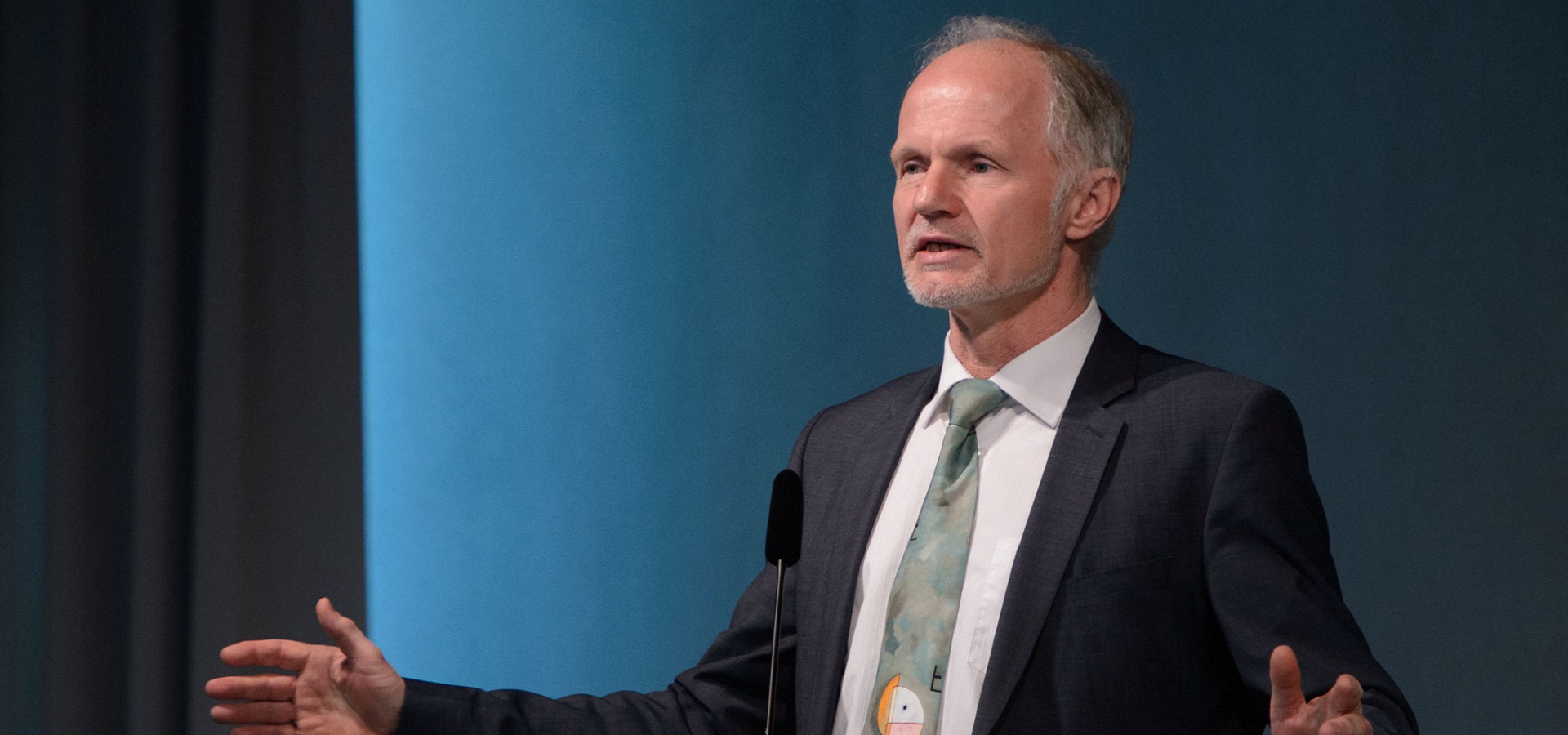Rainer Baake, 64-years old, is a veteran renewable energy politico with roots that stretch back deep into the earliest days of Germany’s renewables movement and the Greens. In March 2018, Baake left the Federal Ministry of Economy and Energy (BMWi), where he headed up the energy portfolio, with a resounding bang. Since then, he’s travelled around the world shooting a film about climate change. Not one to fade away, he’s got a new think tank up and running called Stiftung Klimaneutralität, or the Climate Neutrality Foundation. Paul Hockenos recently met Mr. Baake for lunch.

(CC BY-SA 2.0, Heinrich-Böll-Stiftung)
Like many people who follow Germany’s energy policies closely, I wondered what had happened to Rainer Baake since the current Merkel government came to power in Berlin in 2018. Christian Democrat Peter Altmaier took over the BMWi, in which Baake, a long-time Green, had served as state secretary since 2014 under a Social Democratic minister. Baake’s stretch at BMWi was probably over anyway, but he exploited the moment to its fullest, resigning with a blunt public letter that called out the coalition’s inadequate plans for clean energy and climate. These policies weren’t going to get Germany to its 2020 goals, he quipped. Then he disappeared.
Only the closest friends of Baake and his partner Ranveig Eckhoff, a Norwegian journalist, knew that the couple had taken off, first to Africa, then South and North America, and then Australia. The pair surveyed the boom of solar energy in Namibia, Botswana, and Zimbabwe, and the impact of drought and fires on North America’s expansive forests. They found themselves caught in the middle of the catastrophic wildfires in Australia. “Even though we were 70 km from the actual fires, the streets were so full of smoke that you could hardly see anything,” he told me in his gravelly baritone. Everywhere they went, Baake says, the impact of the climate crisis was even worse than they had expected — the subject of the couple’s forthcoming film and book.
Baake is a key figure in Germany’s embrace of renewables, which has earned him the tag of “Mr. Energiewende.” (In all fairness, there are probably a dozen Mr. or Ms. Energiewendes in Germany just as decisive as Baake: among them scientists, activists, inventors, and other politicians. The Energiewende was never a one-person show.) A native of North Rhine-Westphalia, Baake joined the Greens in 1983 and served in the administration of Marburg-Biedenkopf country in Hesse where his work was noticed by none other than Joschka Fischer, the Federal Republic’s first Green minister in Hesse in the late 1980s. In the early 1990s, when the Greens reentered office in Hesse, Baake was Fischer’s deputy in the environment ministry. The two realos busted a gut to shut down the nuclear power operations at the Hanau and Biblis sites, though with limited results.
Rather, Baake inscribed his name in history books by turning Germany’s national nuclear energy exit into law. He came to Berlin in 1998 to serve as the red-green government’s point person for the phase-out, which was passed in 2002. Over Baake’s seven years in the federal environment ministry there’s hardly a single relevant issue that doesn’t bear his signature, including the seminal Renewable Energy Resources Act (EEG) that opened the way for the expansion of solar and wind power across the country. Since then he has headed up Environmental Action Germany (DUH), a German NGO, and founded the think tank Agora Energiewende before he returned to government office at the BMWi in 2014.
I met Baake at Machiavelli, an Italian resto near the Spree, just off Bertold Brecht Platz. Baake isn’t today, and probably never was, the type to dress casually. He sported a jet-black suit and pressed white shirt without tie.
Some environmentalists have given him guff about the carbon footprint of his around-the-world journey. But, he says, he and his wife lived out of their truck, sleeping in a roof-top, pop-out tent, and warming their bathing water with a solar panel. In light of their scant consumption, their carbon emissions were much the same as when living in Germany, he says.
Though Baake admits he’s still catching up on things he’s missed while away, he already has a new foundation off the ground, Stiftung Klimaneutralität, for which he secured funding in the US, through the San Francisco-based Climate Imperative Foundation. Its purpose is to advise Germany’s federal government, providing it with ready-to-implement policies to help it reach its 2030 emissions-reduction goals, which he notes will probably be pushed up when the EU increases its targets as planned.
Baake admits this will be much easier to accomplish should the Greens be in the next government coalition. “But, even if they aren’t, new ideas are required in Germany,” he says. Germany will probably have to double its annual emissions reductions to hit new 2030 goals. Ever more renewable electricity will be needed to decarbonize other sectors, such as the heating and mobility sectors, he says. Battery production will be huge, according to Baake, because the backbone of the renewables’ buildout will be solar and wind, complemented by hydroelectric power.
Is Baake’s real ambition to find his way back onto the political stage? Like the man who lifted him into office in Hesse, Baake’s not shy of political power – or sceptical of its limitations. “I am not running for political office,” he told the taz in an interview. “My concern is climate protection, and I have promoted it in various roles over the past 29 years. I know what you can do from outside the government, but I also know the government business.”
Nevertheless, should the Greens come to power in 2021, Baake’s name will surely be high on the new cabinet’s short list.